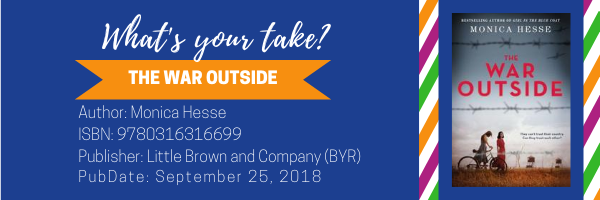By Michele Ebersole, University of Hawaii, Hilo, HI, and Yoo Kyung Sung, University of New Mexico, Albuquerque, NM
Michele and Yoo Kyung continue on the theme of Rethinking Cultural and Physical Borders in Children’s Literature: Understanding Today’s Global Politics Through History. This week, they look at The War Outside by Monica Hesse.

MICHELE: Pairing They Called Us Enemy, which we discussed last week, and The War Outside proved to be a worthwhile reading experience. Both are about the internment camps established during World War II. They Called Us Enemy provides readers with George Takei’s personal experience as a Japanese American, told primarily through the eyes of a young child as a graphic novel while The War Outside tells of the lesser known (family) internment camp that held prisoners of Japanese and German descent as a historical fiction novel.
Reading the graphic novel first provided background information and set the context for the confusing and uncertain times. The illustrations depict the depth of emotions, fear, frustration and suffering experienced by the individuals. The text moves back and forth between George Takei’s story as seen through the eyes of a child and explains the injustice political actions and its effects upon his family and other people of Japanese ancestry living in America at the time. The text speaks to the injustices that his mother and father experienced as a result of political rhetoric and fear generated.
The first book makes the second reading more compelling. It provides contextual background information for what was occurring. Told from two perspectives, a teenage German-American and a teenage Japanese-American live alongside one another in an internment camp in Crystal City, Texas during the war. The story offers the reader a deep sense of empathy for each character. Externally, the girls are different and see the same events through different eyes; internally the universality of emotions shows that they are intricately connected. Trust and the human inclination to “default to truth” (Gladwell, 2019, Talking to Strangers: What We Should Know About the People We Don’t Know) is explored. Margot, a bright 16-year-old German-American from Iowa, is displeased by her father’s growing allegiance with the Nazis. Haruko, a 17-year-old Japanese-American, wonders why her family is imprisoned. The two form a friendship that is paradoxical in nature. They share their fears and secrets that can put their families and personal safety within a prison camp, a highly suspicious and potentially volatile place, in jeopardy. By juxtaposing each character’s perspective, the reader experiences the internal thoughts and emotions of both characters, providing a rich and powerful read. I am deeply moved by this fictional account of imprisonment of people during World War II. It leads us to question why we do the things we do, and how we may justify or explain our actions during confusing and uncertain times.
It made me think about trust in today’s world. With the COVID-19 pandemic there is a great deal of uncertainty and fear that surrounds much of what is happening in today’s world. It seems like during World War II, people were not provided much information about what was going on politically. Some were even taken from their homes and locked away. They had a lack of information that led to fear and uncertainty. Today we have the opposite. We have a great deal of access and an abundance of information–so much information that it becomes almost overwhelming for the average person to sift through and discern what is real and credible and what isn’t. Or perhaps determine who is credible and who isn’t. Or perhaps, who do we trust? Both can lead to fear and uncertainty. Both these text are powerful ways for us to explore and discuss the uncertainty that we may be feeling today.
YOO KYUNG: I agree. You say, “The first book makes the second reading more compelling.” Takei’s book provides concise background information about Japanese internment camps and post-war narratives that illustrate what happened to selected Japanese internees after the camp was closed. Monica Hesse’s book, The War Outside, invites readers to wider and diverse perspectives in different internment camps in Crystal City, Texas that includes German-American internee families as well. Complementing that is Takei’s retelling of his experiences at the camp as family-centered.
The War Outside leaves the ending to the reader with regards to what happens to Magot and Haruko. Their post-war journey is not included. Instead, this book focuses on friendship development between two girls who find their common experiences in family dynamics and tensions besides the reason to be in the camp. Wartime tension in The War Outside is depicted with specific examples such as censored letters from a brother in a war zone, Nazi members and family involvement in German-American community, domestic violence, the humanity of camp guards and internment camps becoming their second home.
I appreciate your connection between WWII and Covid-19’s lack of clarity and trust problem. Uncertainty activated aggressive forms of racism and hate crimes against Chinese-Americans and Asian-Americans. Such similarities between WWII and Covid-19 will draw more powerful discussion in classrooms. During WWII, illegal incarcerations against Japanese-Americans practiced with the label of legal action. Facing Covid-19 seemed to need some kind of common blame and accusatory subject. Incarceration of Japanese-Americans was illegal and violence against Chinese-American is crime, yet such aggressions nearly justified injustice acts when Covid-19 appeared to be Other’s fault. These internment camp books will help us to discuss all these side social issues arising during a pandemic with which public health concerns, which shouldn’t be interpreted as political and ideological agenda.
Title: The War Outside
Author: Monica Hesse
ISBN: 9780316316699
Publisher: Little Brown and Company (BYR)
PubDate: September 25, 2018
Throughout August 2020, Michele and Yoo Kyung give their take on books for young people to rethink cultural and physical borders. Check back each Wednesday to follow the conversation!
- Themes: Michele Ebersole, Monica Hesse, War Outside, Yoo Kyung Sung
- Descriptors: Books & Resources, Debates & Trends, My Take/Your Take
